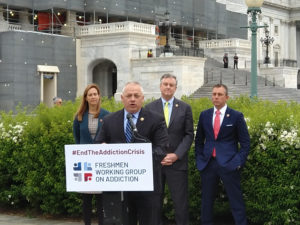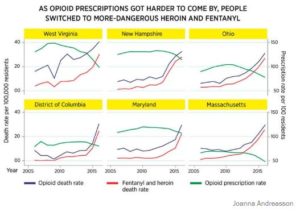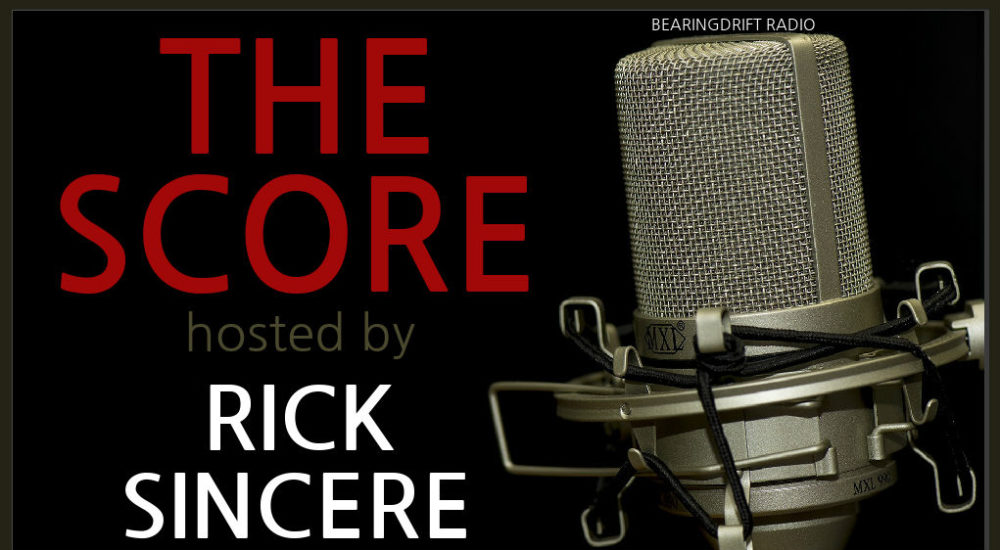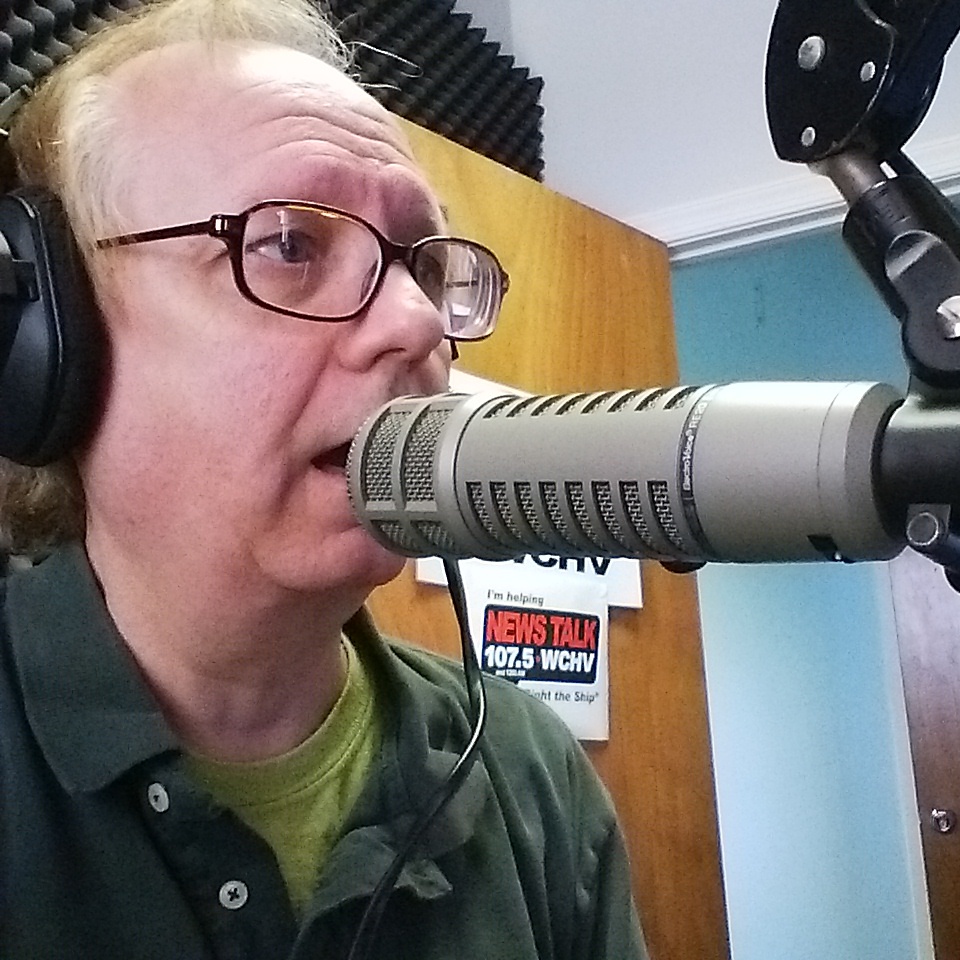The Score: Opioids Crisis, Measles Epidemic, Charlottesville Statues, Muslim Liberalism
This week on The Score – Is there a solution to the opioids epidemic? Should we be scared about measles? What is the fate of the Confederate statues in Charlottesville? Are Islam and liberal values compatible?
This week’s show has an emphasis on public health, with conversations about the current measles outbreak as well as the so-called opioids epidemic. Other topics include the legal status of statues in Charlottesville and whether the ideas of liberty and the ideas of Islam can coexist and cooperate.
Riggleman on Opioids
 Earlier this week, U.S. Representative Denver Riggleman (R-VA5) joined with a bipartisan group of his colleagues — including Representatives David Trone (D-Maryland), Mikie Sherrill (D-New Jersey), and Kelly Armstrong (R-North Dakota) to introduce legislation aimed at giving states flexibility in addressing addiction problems. The bill, he said, came out of conversations within the Freshmen Working Group on Addiction, which has upwards of 50 Members participating in it.
Earlier this week, U.S. Representative Denver Riggleman (R-VA5) joined with a bipartisan group of his colleagues — including Representatives David Trone (D-Maryland), Mikie Sherrill (D-New Jersey), and Kelly Armstrong (R-North Dakota) to introduce legislation aimed at giving states flexibility in addressing addiction problems. The bill, he said, came out of conversations within the Freshmen Working Group on Addiction, which has upwards of 50 Members participating in it.
I talked to Congressman Riggleman by telephone from his office on Capitol Hill on Wednesday. He pointed out that not only are problems — and, therefore, solutions — going to differ from state to state, there are differences within his own district:
When you look at my district, Rick, and you know, it’s 21 counties. Southside has some different challenges than the northern part of the district but of all the challenges there that we have to concentrate on, that’s really the addiction crisis. And although today it was about opioids, it’s really about ending addiction, because, really, we have opioids, we have massive meth issues. Crack, meth, and opioids [are] what we’re finding in the Fifth District. We have Sinaloa Cartel activity, we have pure meth that’s coming in through Southside, we have opioids further up north in the more suburban areas. So really, this is about fighting the addiction crisis. And what we’re trying to do is to give states the flexibility to utilize funds or to fight it the best way they know how, based on their environment
Later in the program, we hear from journalist Jacob Rich, who has dug deep into the subject of opioid use and abuse.
Measles Rising
 While we’re on the subject of public health, measles has been in the news. There have been more cases of measles this year in the United States than in the previous quarter century. To learn more about this disease, I spoke to Dr. Sarah Boggs, who is assistant professor of pediatrics at the University of Virginia. I asked her whether measles is as benign as some people make it out to be, and she said:
While we’re on the subject of public health, measles has been in the news. There have been more cases of measles this year in the United States than in the previous quarter century. To learn more about this disease, I spoke to Dr. Sarah Boggs, who is assistant professor of pediatrics at the University of Virginia. I asked her whether measles is as benign as some people make it out to be, and she said:
Measles has a risk of death of about one to two people per thousand people and about one in four people will get pneumonia, about one in one thousand people will have brain swelling. So there there are lots of severe consequences. There also is a risk of your infections that can lead to permanent hearing loss.
Moreover, measles is unusually contagious. When physicians think about infections, Dr. Boggs said,
we think about how is that infection spread. Some infections are spread only through contact with body fluids, blood or saliva; some infections are spread through touch; and some infections are spread through air. So if you sneeze or cough, and you have measles, those infectious droplets that you have sneezed or coughed out, can stay in the air where you were for up to two hours afterwards. So somebody who is not immune to measles, can walk through a room two hours later and get measles. So it’s very contagious.
Our conversation also included information about the history of the measles vaccination, when children (and adults) should be vaccinated, and whether there are any risks to being vaccinated.
Statues Statute
 For the past two years, there has been both a metaphorical and literal battle surrounding the statues of Confederate generals in Charlottesville. When the Charlottesville City Council voted to remove the statue of Robert E. Lee that had been erected in the 1920s, the issue attracted the attention of incels and other social misfits who swarmed the city on August 12, 2017, with fatal consequences.
For the past two years, there has been both a metaphorical and literal battle surrounding the statues of Confederate generals in Charlottesville. When the Charlottesville City Council voted to remove the statue of Robert E. Lee that had been erected in the 1920s, the issue attracted the attention of incels and other social misfits who swarmed the city on August 12, 2017, with fatal consequences.
There is also a legal battle, in which citizens are suing the City of Charlottesville to prevent the removal of those statues. I spoke to attorney Charles Weber, who is a spokesman for the plaintiffs in that case, to find out where the law suit stands. The judge in the case, Richard Moore of the Charlottesville Circuit Court, issued a 9-page letter on April 25 that explained:
that the two statues of Robert E Lee and Stonewall Jackson are war memorials within the meaning of what I call our “monument protection” law. Virginia Code 15.2-1812 is the one that prohibits the city from removing the statues. That’s what the case is really all about: the rule of law. One of [the defendants’] arguments was well, they’re not really war memorials… They were erected in the 1920s. They’re memorials to Jim Crow. They’re there to intimidate people and things of that nature. And the judge listened to all of that. He said, all that stuff is irrelevant. Even if it’s true, it’s irrelevant to what these statues are, right? He said, everybody’s admitted that it’s Jackson and Lee. They’re in their Confederate uniforms. They’re on their horses. They have all the accoutrements of Civil War Confederate veterans. And, he said, that the statue speaks for itself. And it really is, what it looks like it is which is a war memorial to veterans of the War Between the States. He also said that the Jackson statue could be a memorial to the war itself, because on the pedestal, there are inscriptions of various battles…
I recommend listening closely to our conversation, because although Buddy Weber is a plaintiff in the civil suit against the City of Charlottesville and he speaks on behalf of the plaintiffs, he lays out both sides of the case in a fair (one might say lawyerly) fashion. For such a heated issue, he presents it with balance if not with disinterest.
Islam and Liberalism
 Last week I was at the Cato Institute in Washington where I met with Mustafa Akyol, who writes about the links between Islam and liberty. He explores the question of whether Muslim values are compatible with liberal values. (We use “liberal” here in the sense of the political and social system that emerged from the Enlightenment thinkers of the 17th and 18th centuries such as Edmund Burke, Jean-Jacques Rousseau, Adam Smith, Thomas Paine, and Thomas Jefferson. The term encompasses what Americans call conservatives and liberals or progressives.)
Last week I was at the Cato Institute in Washington where I met with Mustafa Akyol, who writes about the links between Islam and liberty. He explores the question of whether Muslim values are compatible with liberal values. (We use “liberal” here in the sense of the political and social system that emerged from the Enlightenment thinkers of the 17th and 18th centuries such as Edmund Burke, Jean-Jacques Rousseau, Adam Smith, Thomas Paine, and Thomas Jefferson. The term encompasses what Americans call conservatives and liberals or progressives.)
My first question was, how did he discover libertarian ideas? Then our conversation turned to whether Islam and liberalism are compatible.
Regarding Islam, here’s what I can say. Mainstream, traditional Islam is not liberal. It is not necessarily terrorists. I mean, terrorism is a very extreme phenomenon….
I’m not going to deny it. But what people like me point out is a few things. First of all, there were also alternative views in Islam, especially in the formative centuries, that didn’t become mainstream because of accidents of history, or because the governments didn’t conform, but they had proto-liberal ideas that we can revisit and develop today.
We are also saying none of all these problems are coming directly from the root of the religion, the Quran, it’s coming from historical interpretations of it. And those interpretations can be challenged. It’s not an easy battle. It’s an uphill battle.
Mustafa Akyol is a senior fellow at the Cato Institute’s Center for Global Liberty and Prosperity. He is the author of The Islamic Jesus: How the King of the Jews Became a Prophet of the Muslims (2017) and Islam without Extremes: A Muslim Case for Liberty (2011). That latter book was banned in Malaysia for “promoting liberalism” but, if you have any friends there, you can download a Malay-language edition for free and send it their way.
Opioids Exaggerated
 Earlier in the program, we talked with Congressman Denver Riggleman about how Congress is responding to the opioid epidemic. One day earlier, on Tuesday of this past week, I also spoke with journalist Jacob James Rich about that topic.
Earlier in the program, we talked with Congressman Denver Riggleman about how Congress is responding to the opioid epidemic. One day earlier, on Tuesday of this past week, I also spoke with journalist Jacob James Rich about that topic.
Rich, who is affiliated with Young Voices and the Reason Foundation, has challenged some of the assumptions made about the overuse of opioids — both prescription painkillers and illegal drugs like heroin. Among his articles on the topic are “Examining CDC’s State-by-State Data on Drug and Opioid Overdose Deaths“; “To succeed, Beto needs to fix his bad understanding of the opioid crisis“; “Moody, state need new approach to opioid problem” (co-authored with Adrian Moore); “Congress Needs an Opioid Intervention“; and “The opioid crisis — this generation’s Vietnam?”
Be sure to come back next week when I’ll be talking to historian David Johnson about the “Lavender Scare” and the new documentary film based on his book of the same name, which has its television premiere on PBS next month, and the capitalist origins of the gay rights movement, which he describes in his recent book, Buying Gay. We’ll also hear from Alexander Hammond, a previous guest on The Score, about free trade in Africa. I anticipate some pleasant and provocative surprises, as well.
In the meantime, May the Fourth Be With You.


